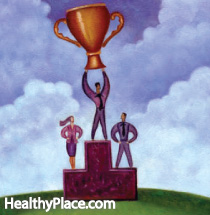Exploring the Role Relationships Play in the Development of an Eating Disorder
Different relationships with different people can all have a diverse effect over their contribution to the onset of an Eating Disorder. It is important to point out that this section is about possible environmental factors in the development of a type of Eating Disorder and is not about blame. Below are just some suggestions on the topic organized into the following categories:
PARENTS | SIBLINGS | PEERS | LOVE | WORK
...with Parents
- Children seek acceptance from their parents. They often need validation that they are doing good in their parent's eyes. If there is a lack of praise the child may feel disapproved of, thus contributing to a low self-esteem.
- In some families where one parent is the stronger force of discipline, the parent taking on this role may tend to see disobedience as a direct defiance, and may often lose their patience more quickly than the other. Because of this, children sometimes get the sense very young that nothing they do is ever good enough, in that parent's eyes. This can lead to perfectionistic behavior and unhappiness with everything they do.
- Obsession with weight and body image by one or both parents will lead to the same in their children. Compulsive Overeating, Anorexia Nervosa, or Bulimia Nervosa by one or both parents increases a childs risk for developing an Eating Disorder.
- If either parent has a negative means of coping with life (Eating Disorder, Alcoholism, Drug Addiction) the child will be at an increased risk of developing a negative coping mechanism, including an Eating Disorder.
- Parents who are workaholics and who have a problem meeting obligations to their children (ie., appointments with teachers, awards ceremonies, sports events etc.) often make them feel less important and unapproved of. Children in these situations may feel as though no one is there for them and may turn to other means of coping with problems.
- If there is abuse (physical, emotional or sexual) by either or both parents the child will learn to blame themselves, to think that everything is their fault, that they never do anything right, and that they deserve to hate-themselves (low self-esteem). They may also feel "disgusting" and "dirty", may want to push other's away and may feel a desire to be "invisible".
- Divorce within the family, particularly during a child's teen years (when they are already seeking acceptance from their peers and face hormone and body changes) can make the child seek attention and acceptance from one or both parents. It can create stress and feelings of sadness and loneliness.
- Lack of communication with parents, or lack of validation from parents will make a child feels as though their feelings don't matter, that what they do and feel is meaningless, and that they are not loved or accepted.
- Children in environments where there are told to control their emotions (ie., don't cry, don't yell, don't get mad at me) or who are punished for expressing emotion (ie., I'll give you something to cry about) will grow up believing they must stuff their emotions inside. This leads to looking for other ways to coping with sadness, anger, depression and loneliness.
- Parents who are perfectionists and/or who are particularly hard on themselves will set an example for their children to do the same. In addition, if they set unusually high expectations on themselves or their children to achieve certain levels of success, it can lead to a child being overly hard on themselves and feeling of "I'm never good enough."
- If either parent suffers from an existing psychological condition (whether diagnosed or not) such as depression, obsessive compulsive disorder or anxiety, recent studies indicate that their child may be born with a pre-disposition to the same. This pre-disposition would increase their chances of developing a need to cope with the emotional attributes of the illness later on, thus possibly developing an Eating Disorder. Also read Associations and Addictions.
- Long-term and/or severe illness in either parent can create a disrupted environment to the child. In a lot of cases it may increase the child's level of responsibility in the family. It can make them feel out of control, depressed and lonely (like they've been forgotten or their needs are unimportant). There may also be a subconscious desire to be sick themselves in order to emulate the ill parent, or in order to seek other's acceptance and attention.
- Abandonment by a parent can lead a child to question their identity, if they deserve to be loved, if they are good enough, and why the estranged parent left. It can cater to a low sense of self-worth.
- The death of a parent creates an extreme trauma in a child's life. They may feel angry, powerless and depressed. They may find a way to blame themselves. They may sense a need to find something in their life to give them a sense of control. A child who loses a parent is more apt to develop depression, alcoholism, drug addiction or an Eating Disorder.
- If a parent commits suicide it increases the likelihood that they will develop of severe form of depression and a need to cope with it (alcoholism, drug addiction, eating disorder). There is also a higher risk of the child committing suicide.
- A little girl, particularly an only-child or from a family of girls, may sometimes feel as though her father wanted a boy. This can create an emotional conflict for her once she reaches puberty, at the onslaught of her developing body. An Eating Disorder can be her rebellious attempt to control her expanding hips and growing breasts.
- Little girls tend to want to be the type of women their fathers would like or marry. Fathers who make comments about body-size and weight about other women, their wives and their daughters can make the child feel as though the size of her body dictates how much he will love her. It can create an obsession with her weight and a battle to seek her father's love and approval.
- Being that women tend to have a higher percentage of body-image issues than men, mothers tend to influence their daughter's beliefs about being comfortable with their own bodies. A girl with a mother who has disordered eating patterns, who continuously diets or is obsessed with appearance, and who may constantly berate herself and/or her daughter about weight, will have a much higher chance of developing an Eating Disorder later on.
- Girls may be influenced by mothers who seek to raise them as "good wives to a husband". Be proper, don't gain weight, keep up with your looks, never be caught dead without make-up all contribute to the belief that they only deserve love if they look their best. Mother may also lay a great deal of importance in cooking for a husband, while at the same time sending messages to not gain weight and/or don't eat too much. These can all contribute to the thought that food and/or weight equals love.
...with Siblings
- A twin who is affected by feeling a need to create an identity of their own, may develop an Eating Disorder as a rebellious attempt to control how they look. In addition, if one twin has an Eating Disorder it increases the changes of the other developing one (based on mutual genetics, environment, and the influence twins have on each other.)
- Siblings pick on each other. Continuous harassment involving weight and body image issues by a brother or sister may contribute to a child's development of an Eating Disorder.
- Abuse (emotional, physical or sexual) by siblings can lead the child to blame themselves, to think that everything is their fault, that they never do anything right, and that they deserve to hate-themselves (low self-esteem). They may also feel "disgusting" and "dirty", may want to push other's away and may feel a desire to be "invisible".
- If a child feels they are "left out" amongst their siblings, or comparatively to their siblings with their parents, the will feel low self-worth and a need for acceptance.
- Long-term and/or severe illness in a sibling can create a disrupted environment to the child. In a lot of cases it may increase the child's level of responsibility in the family. It can make them feel out of control, depressed and lonely (like they've been forgotten or their needs are unimportant). There may also be a subconscious desire to be sick themselves in order to get equal attention or acceptance from parents and other family members.
- The death of a sibling creates an extreme trauma in a child's life. They may feel angry, powerless and depressed. They may find a way to blame themselves. They may sense a need to find something in their life to give them a sense of control. They may feel the loss of their parents as their parents attempt to deal with the loss themselves. A child who loses a brother or sister is more apt to develop depression, alcoholism, drug addiction or an Eating Disorder.
...with Peers
- A child who is above average intelligence, who expresses tremendous individuality or who has a unique gift or talent may have feelings of unacceptance from peers. They may have a strong need or desire for acceptance and to fit it. There may be increased pressures placed on the child to achieve.
- A child with weight problems who is continuously picked on may develop a lack of self-worth and a desire for love and acceptance. This can lead to depression and further withdrawal, and/or obsessive weight concerns and body-image issues.
- A child who is continuously picked on for any one particular flaw (ie., small mole or scar on their face) may develop a lack of self-worth and a desire to be loved and accepted. This can lead to depression and withdrawal, and/or they may seek acceptance by attempting to control their weight.
- Children who are shy or have a problem making friends will have a sense of lonliness. They will want to be accepted by their peers and may suffer from depression for not feeling as though they are. They may look for ways to fill a void within themselves through food. They may look for ways to seek acceptance through weight loss.
- There are additional pressures to fit in during puberty an adolescence. As well, some girls will develop sooner than others and may face ridicule because of it, making them hate and want to hide the development of the bodies. Harassment by boys at this age can cater to feeling uncomfortable and having feelings of shame.
- Kids participating in sports and athletic activities (such as dance or cheerleading) may feel additional pressure from their coaches and peers to achieve certain body types. This can be common in ballet, gymnastics, cheerleading, figure skating, swimming and wrestling. It is not uncommon to find peers introducing and sharing unhealthy diets and disordered eating patterns.
- Groups of kids who seem to start a "diet" together may be at risk. Often times they share purging tips and ways to restrict, comparing with each other how much they didn't eat. Because they seek acceptance amongst each other and because of the unhealthy nature of diets to begin with, this obviously is behavior that can lead to the start of an Eating Disorder.
...in Love Relationships
- During the teen years it's common for kids to seek acceptance from each other. They are trying to become comfortable with their bodies and the changes they are going through. Within the dating environment it's not uncommon for teens to want to please each other with the way they look. It's common to hear girls talking about losing weight and staying thin.
- Harassment between girls and boys/women and men about weight can lead to a low self-esteem and an obsession with body-image and weight.
- A cheating partner can make the other feel inadequate, ugly and foolish. It can lead to depression. This can easily translate into an obsession with weight and body-image.
- Emotional and physical abuse within a relationship can cut it's victim down, making them feel small and to-blame. It can lead the victim to try desperately to get acceptance and approval from their abuser. They often blame themselves.
- Divorce in a marriage leaves its participants back in an awkward dating scene again. Not only can the divorce itself leave a person feeling unloved and unacceptable, there may be an obsession with body-image and weight over the prospect of finding another mate. People who find themselves divorced may also feel lonely and like there is a void inside which can lead to overeating.
- A woman who is date-raped may feel a need to blame herself. She may look at herself as weak and stupid. She may feel used, dirty and ashamed. This can lead to depression, anger, withdrawal and problems with self-worth, which can all lead to disordered eating.
- Alcoholism within a relationship can lead to feelings of powerlessness and unhappiness. It can lead to thoughts such as "why don't I make him/her happy" and "why can't I help him/her stop." There is a sense of loss of control.
- After childbirth a woman may feel at a loss over the weight she has gained during pregnancy. Her husband or boyfriend may continuously mention her weight or pick on her for it. In addition there are stresses on her to perform as a mother. She may feel her life is out of her hands and with increased focus on the baby, like she doesn't matter.
...in the Workplace
- Increased pressures to be successful in the workplace and fit the ideal "woman professional" may lend themselves to feelings of stress to lose weight or get in shape.
- Pressures placed on people by society to fit the ideal professional may lend themselves to body-image problems and weight loss issues. There may be size-discrimination at a job that makes prospects for promotion seem dim without weight loss. This can lead to problems with body-image.
- Comments, gossip and whispering about a persons weight will make them feel worthless and seeking acceptance. This can make the person feel depressed and alone, and can lead to body-image and weight issues.
- Bosses telling employees to watch their weight or loss weight in order to keep their job, or to get a promotion can lead to feelings of inadequacy and powerlessness (this is also size-discrimination).
- Sexual harassment on the job will lead its victims to self-worthless feelings, confusion, feelings of inadequacy, and powerlessness. Victims often blame themselves.
next: Figuring Out Food Labels
~ eating disorders library
~ all articles on eating disorders
APA Reference
Tracy, N.
(2009, January 15). Exploring the Role Relationships Play in the Development of an Eating Disorder, HealthyPlace. Retrieved
on 2025, October 18 from https://www.healthyplace.com/eating-disorders/articles/exploring-the-role-relationships-play-in-the-development-of-an-eating-disorder
 Different types of eating disorders spread through the culture because of social pressure from many sources. But for young women who play sports, the chief agent in transmitting the disease may very well be their boss--the coach. Athletes are six times more likely to develop eating disorders than are other women, reports Virginia Overdorf, Ed.D., a professor of movement science at William Paterson College in Wayne, New Jersey. She believes that coaches unwittingly contribute to the problem by extolling the virtues of weight loss to improve performance.
Different types of eating disorders spread through the culture because of social pressure from many sources. But for young women who play sports, the chief agent in transmitting the disease may very well be their boss--the coach. Athletes are six times more likely to develop eating disorders than are other women, reports Virginia Overdorf, Ed.D., a professor of movement science at William Paterson College in Wayne, New Jersey. She believes that coaches unwittingly contribute to the problem by extolling the virtues of weight loss to improve performance.
 We need to give up the idea of having to have any one of the two people who make up a relationship be subservient or number two. This idea takes some work because many people believe that one should be over the other. This is a bad idea.
We need to give up the idea of having to have any one of the two people who make up a relationship be subservient or number two. This idea takes some work because many people believe that one should be over the other. This is a bad idea. Both Wendy and CZ said the intent of the pro-anorexia sites (aka pro-ana sites) is not to promote eating disorders in hopes of recruiting converts. Their comments suggest that they consider the Internet "clubs" they frequent to be exclusive sororities where they can express their feelings without being judged. Australian researcher Megan Warin says a sense of community and belonging is strong among anorexics and helps explain why treating the condition is so difficult.
Both Wendy and CZ said the intent of the pro-anorexia sites (aka pro-ana sites) is not to promote eating disorders in hopes of recruiting converts. Their comments suggest that they consider the Internet "clubs" they frequent to be exclusive sororities where they can express their feelings without being judged. Australian researcher Megan Warin says a sense of community and belonging is strong among anorexics and helps explain why treating the condition is so difficult.